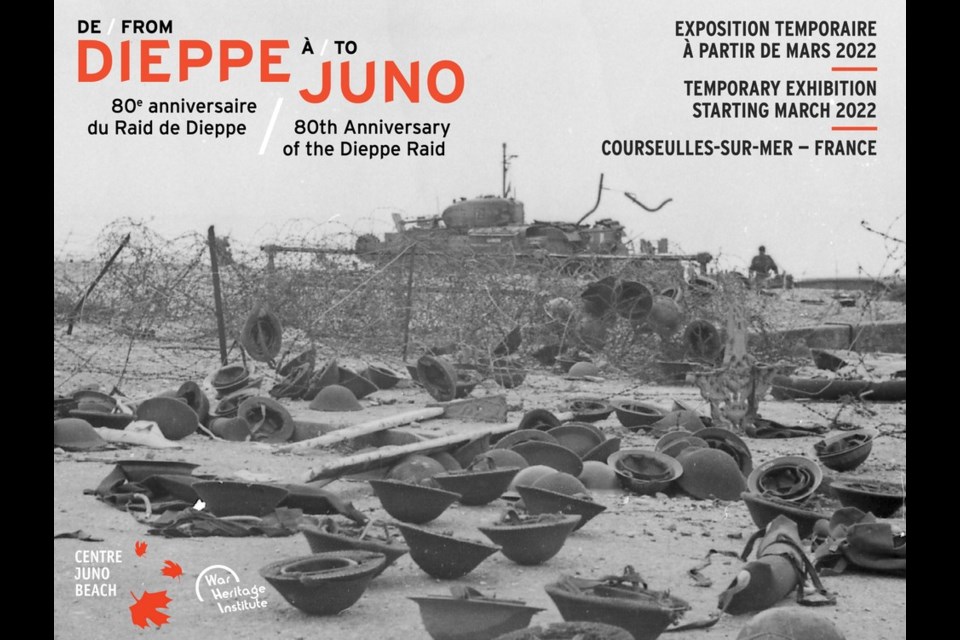It’s still more than a year away, but the Juno Beach Centre in Normandy, France, is gearing up to honour the 80th anniversary of the Dieppe Raid, an ill-fated Second World War battle that involved thousands of Canadians.
The Allies raided the French coastal port on Aug. 19, 1942. The attack involved 4,963 Canucks and 1,000 British and American troops and was the Canadian Army’s first major combat against Germany during the war.
However, after nearly 10 hours of fighting, two-thirds of the Canadian forces were dead, wounded or captured; 907 Canadian men were killed or died of wounds, 2,460 were wounded, and 1,946 were taken prisoner. That’s more prisoners than the Canadian Army lost in 11 months of fighting during the Northwest Europe campaign of 1944-1945.
Fewer than half the Canadians who departed for Dieppe made it back to England. Almost 600 were buried in the Dieppe Canadian War Cemetery in Hautot-sur-Mer, France.
To honour this raid, the Juno Beach Centre is working with the War Heritage Institute (WHI) in Brussels, Belgium, to produce the temporary exhibition entitled From Dieppe to Juno: The 80th Anniversary of the Dieppe Raid. The exhibition will open on March 12, 2022, in Courseulles-sur-Mer, one of the first French communities Canadians liberated during the 1944 D-Day invasion of Normandy.
“This exhibition will present just how deep the imprint of the Dieppe Raid is in Canadian collective memory of the Second World War,” said Marie Eve Vaillancourt, director of exhibitions for the Juno Beach Centre.
“It is an exhibition about trauma but also about healing and the many ripple effects of the raid since that day in August 1942. It is an exhibition about why Dieppe will always occupy such a large place in our understanding of Canada's Second World War experience.”
From Dieppe to Juno will feature artifacts and testimonies from people who participated in or were affected by the raid. Visitors will be thrust into the tense context of 1942, the height of the Nazi regime’s powerful grip over Europe. Highlights will include almost 30 items from WHI exclusively for the exhibition.
The legacy of the raid extends beyond borders and time. In re-telling the story, the JBC and WHI will explore the effects of that legacy through witnesses’ experiences.
“We want to give more space to voices heard less often: mothers, wives, citizens of Dieppe, and the prisoners of war, for instance,” said Vaillancourt. “We want to immerse our visitors into the events of this one particular day in history but also allow them to gain a sense of why Dieppe means so much to Canadians in the present day.”
The Dieppe Raid remains one of the most identifiable events in Canadian war history and for decades occupied a greater place in collective memory than D-Day. However, it was not until recent years that Juno Beach caught up with Dieppe in importance.
This new exhibition will also explore how the mythology linking the horror at Dieppe to the success of the Canadians on D-Day has evolved over time.
“Discussing a disaster in contrast with a victory such as Juno Beach on D-Day is a huge challenge,” said Vaillancourt. “It’s often easy to make shortcuts between Dieppe and Juno; that the disaster helped save lives on D-Day. In this exhibition, we try to debunk some of these claims and better explain how and why such conclusions have often been hastily drawn over the years.”
Long remembered as a tragic failure, the story of Dieppe is complex and nuanced. Historians have studied it intensely and scholars and hobbyists alike have debated it often. For visitors learning about the topic for the first time, From Dieppe to Juno will provide an accessible, factual overview of the planning, the raid itself, and aftermath. For more knowledgeable visitors, the exhibition will also delve into facets of the raid not often explored.
This will be the JBC’s first new exhibition since the pandemic closed the museum’s doors for most of 2020. With several major war commemorations on the horizon, JBC staff are looking forward to giving visitors another chance to remember the 1.1 million Canadians who served in the Second World War.
More information about From Dieppe to Juno is available at junobeach.org.




